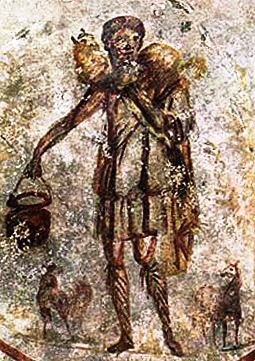 This blog was originally part of a series I wrote for Mustard Seed Association.
This blog was originally part of a series I wrote for Mustard Seed Association.
If you’ve been following along, I have been encouraging all churches, everywhere to minister to the poor. For many churches, but not all, this means inviting all kinds of people into their facility, of all faiths, and some with no real faith at all. Let me tell you, when we welcome anyone and everyone into our holy place of worship, we get some interesting situations.
Some, without thinking, have blasphemed God in our sanctuary.
Others have attempted some sexual activity in worship areas.
And there are a few who have shown no regard to church authority, yelling at them, cussing them out, even threatening to hit them.
This kind of activity is not the norm, but it happens. And some church members, when faced with this, are deeply offended and want to punish such offenders severely.
In a recent book by Jonathan Haidt*, a professor of political psychology, he lists out a number of ethical norms that all people share. There are a few, however, that he separated out because people look at these ethical standards so differently than others. A couple of these are the ethic of sanctity and the ethic of authority. To have a value of sanctity is to say that there are some places or actions that are holy in and of themselves. The value of authority is to say that authority is granted upon certain people, and this authority must be recognized and respected. However, there are many people in our world today that do not hold to an idea of a sacred space or sacred action, and they may mock or do distinctly unholy actions in a place we consider deserving of reverence. Also, there are many people who consider authority as something to be earned, not granted, and so an authority is one who acts as an authority ought to act and they will then deserve respect.
 It is interesting that Jesus seemed to take the idea of sacred space in a different way than most of us. The temple was a sacred space, but this meant that it needed to be open to the whole world. When the High Priest packed the Court of Women and Gentiles with money changers, Jesus drove them out, saying, “My house will be called a house of prayer for all the nations.”(Mark 11:17) It is holy for the sake of the whole world, not just those who have been set aside as sacred.
It is interesting that Jesus seemed to take the idea of sacred space in a different way than most of us. The temple was a sacred space, but this meant that it needed to be open to the whole world. When the High Priest packed the Court of Women and Gentiles with money changers, Jesus drove them out, saying, “My house will be called a house of prayer for all the nations.”(Mark 11:17) It is holy for the sake of the whole world, not just those who have been set aside as sacred.
Jesus also held a different view of authority. While he didn’t disagree that a person could have authority handed down to them, the authorities that took on his name were not to take that authority for granted. The authorities appointed by Jesus are not to take on high titles, but instead are to act like servants to others, to be the most humble of all. ( Matthew 23:8-12; Luke 22:25-27)
The one most deserving of respect is God, the Creator and Father of all, Lord of Heaven and Earth. Yet this very God of gods grants respect to us all, by giving us the ability to make our own decisions and to hold authority on earth that is really His own. Even if we misuse His authority, He does not take it away from us. God asks for worship and praise, to thank Him for the never ending gifts He grants to us. Nevertheless, when some are ungrateful to Him, He never takes away the sustaining rain. When some speak of Him in an evil way, He never withholds his grace of food or life. Even to the most disrespectful and wicked He continually sustains. (Matthew 5:45; Luke 6:35-36)
Even so, we must welcome people to be respectful of our place and authority, but not punish those who do not give it. If we have offered food, assistance and love to all those who need it, then we should not take our ministry away because some have not offered respect. After all, we are the servants of Him who was despised by all so that He might save all, the one who taught us: “Blessed are you who are persecuted.” (I Peter 2:23; Matthew 5:11)
Some things to remember in our ministry to the poor:
Worship is to be offered, not demanded
Worship is a matter of the heart, not of action. We should never require worship as a payment for eating or other kinds of service. But we should always offer worship to the poor, giving them the opportunity to give thanks to the Giver of food and life.
Remind people of sacred space
We should not punish people for not respecting our sacred space, to take away the free gift of God because they disrespect the place where God dwells. Rather, we should gently remind people that the space they are in is holy and we should act with reverence, in as much as we are able (or remember).
Earn respect
The poor are constantly demanded of, and it doesn’t help them or your relationship with them to demand respect. To obtain respect from the poor, we must earn it. We must speak with gentleness, we must listen to them and understand their needs. We should go out of our way to meet their needs if we have the resources, and display sincere love for all. Then we will never have to ask for respect, because it will be given gladly.
*I highly recommend Jonathan Haidt’s book, The Righteous Mind: Why Good People Are Divided by Religion and Politics.










